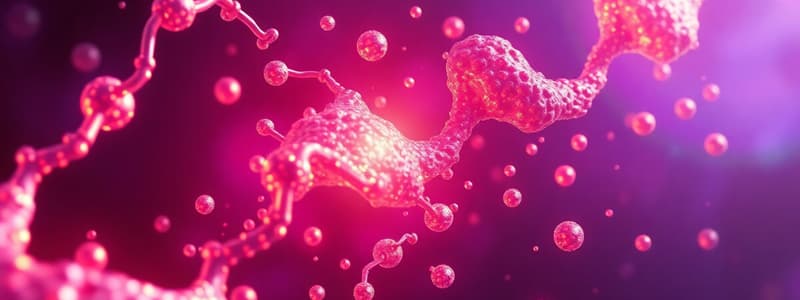Podcast
Questions and Answers
What indicates a positive result in the Biuret test for proteins?
What indicates a positive result in the Biuret test for proteins?
- A purplish violet color (correct)
- A green color
- A yellow color
- A colorless solution
Which of the following is NOT a step in performing the Ninhydrin test?
Which of the following is NOT a step in performing the Ninhydrin test?
- Observing and recording the results
- Adding 5 drops of 0.1% Ninhydrin solution
- Heating in boiling water for 10 minutes
- Adding a drop of CuSO4 solution (correct)
What does a zwitterion refer to in amino acids?
What does a zwitterion refer to in amino acids?
- A type of protein consisting of multiple amino acids
- An amino acid that can exist in multiple ionized forms
- An amino acid with a net charge
- An amino acid with no overall charge at a specific pH (correct)
What is the key characteristic of nonpolar amino acids?
What is the key characteristic of nonpolar amino acids?
During the Xanthoproteic test, what substance is added to the protein suspensions?
During the Xanthoproteic test, what substance is added to the protein suspensions?
What role do proteins play in organisms?
What role do proteins play in organisms?
Why may no color develop in the Biuret test initially?
Why may no color develop in the Biuret test initially?
What is the first step in performing the Biuret test?
What is the first step in performing the Biuret test?
What is the main purpose of adding saturated NaOH drop by drop to the protein solutions?
What is the main purpose of adding saturated NaOH drop by drop to the protein solutions?
Which test requires the addition of Millon’s reagent and involves heating the mixture?
Which test requires the addition of Millon’s reagent and involves heating the mixture?
What potential effect may occur if too much Millon’s reagent is used during the test?
What potential effect may occur if too much Millon’s reagent is used during the test?
What is the purpose of adding bromine water in the Sakaguchi Test?
What is the purpose of adding bromine water in the Sakaguchi Test?
Which of the following amino acids is NOT mentioned for use in the Millon’s Test?
Which of the following amino acids is NOT mentioned for use in the Millon’s Test?
During the heating process in Millon’s Test, what observation should be made?
During the heating process in Millon’s Test, what observation should be made?
Which reagent is used alongside NaOH in the Sakaguchi Test?
Which reagent is used alongside NaOH in the Sakaguchi Test?
What process is conducted to assess the proteins using the Biuret and Xanthoproteic tests?
What process is conducted to assess the proteins using the Biuret and Xanthoproteic tests?
What color is obtained when hydroxyproline and proline are tested with Hopkins-Cole reagent?
What color is obtained when hydroxyproline and proline are tested with Hopkins-Cole reagent?
What is the role of conc. H2SO4 in the first step of the Hopkins-Cole test?
What is the role of conc. H2SO4 in the first step of the Hopkins-Cole test?
What indicates a positive result in the Biuret test?
What indicates a positive result in the Biuret test?
Which substance is specifically identified by the Millon’s test?
Which substance is specifically identified by the Millon’s test?
What color is observed when asparagine is tested in the Hopkins-Cole test?
What color is observed when asparagine is tested in the Hopkins-Cole test?
Which reagent is used in the Xanthoproteic test to produce a yellow color?
Which reagent is used in the Xanthoproteic test to produce a yellow color?
What does a lack of color change in the Hopkins-Cole test indicate?
What does a lack of color change in the Hopkins-Cole test indicate?
What is the expected change in color for a positive Millon’s test?
What is the expected change in color for a positive Millon’s test?
What indicates a positive result in the Hopkins-Cole test?
What indicates a positive result in the Hopkins-Cole test?
In the Lead Acetate Test, the formation of a black precipitate suggests the presence of which amino acids?
In the Lead Acetate Test, the formation of a black precipitate suggests the presence of which amino acids?
Which statement correctly describes the expected reaction of the Hopkins-Cole test?
Which statement correctly describes the expected reaction of the Hopkins-Cole test?
Which amino acid does not yield a positive result in the Lead Acetate Test?
Which amino acid does not yield a positive result in the Lead Acetate Test?
What does a negative result in the Hopkins-Cole test indicate?
What does a negative result in the Hopkins-Cole test indicate?
What indicates a positive result in the Biuret test?
What indicates a positive result in the Biuret test?
What does the presence of a deep blue color in the Ninhydrin Test signify?
What does the presence of a deep blue color in the Ninhydrin Test signify?
Which reagent is involved in the Sakaguchi Test?
Which reagent is involved in the Sakaguchi Test?
What indicates a negative result in the Ninhydrin Test?
What indicates a negative result in the Ninhydrin Test?
In the Sakaguchi Test, what is the expected color change that signifies a positive reaction?
In the Sakaguchi Test, what is the expected color change that signifies a positive reaction?
What does a yellow precipitate of Mercuric (II) oxide indicate in the context of the Biuret test?
What does a yellow precipitate of Mercuric (II) oxide indicate in the context of the Biuret test?
Which of the following are components of the Ninhydrin Test?
Which of the following are components of the Ninhydrin Test?
What does the formation of a red-colored complex in the Sakaguchi Test primarily indicate?
What does the formation of a red-colored complex in the Sakaguchi Test primarily indicate?
Flashcards are hidden until you start studying
Study Notes
Qualitative Tests for Proteins/Amino Acids
- Proteins are made up of amino acids arranged in a linear chain.
- They are an essential part of living organisms and participate in various cellular processes.
- Amino acids are the monomer units of proteins.
- They contain an amino group, a carboxyl group, and a side chain.
- The specific pH at which an amino acid has no overall charge is known as its isoelectric point.
- At this point, they are known as zwitterions.
- Nonpolar amino acids have hydrocarbons (C and H atoms).
Biuret Test
- It positively identifies the presence of proteins and peptide bonds.
- It requires at least two peptides to give a positive reaction.
- The test involves the formation of a complex between proteins and Cu2+ ions in a strongly alkaline solution.
- While the test is named after Biuret (a chemical derived from urea), the reagent used does not contain Biuret.
- A purplish violet color indicates a positive test.
- A blue color indicates a negative test.
Ninhydrin Test
- Detects the presence of amines or α-amino acids.
- A deep blue color indicates a positive test.
- A purple color indicates the presence of ammonia, primary/secondary amines, or amino acids.
- A yellow color indicates the presence of hydroxyproline and proline.
- A brown color indicates the presence of asparagine.
Xanthoproteic Test
- A qualitative test that determines the amount of protein in a solution using nitric acid.
- It is named after xanthoproteic acid, a yellow compound produced in the reaction, derived from the Greek word "xanthos" meaning yellow.
- A yellow to orange colour is a positive result.
- No color change indicates a negative result.
Millon's Test
- Specific for phenol-containing structures (Tyrosine).
- The reagent contains concentrated HNO3 with dissolved mercury.
- A brick red colored solution or precipitate indicates a positive test.
- A yellow precipitate of Mercuric (II) oxide (HgO) might indicate the solution is too alkaline.
- No red color indicates a negative result.
Sakaguchi Test
- Based on the reaction of 1-naphthol with guanidinium groups on arginine in the presence of an oxidizing agent.
- The exact mechanism is unknown, but a red-colored complex is formed due to an indole-like structure.
- The Sakaguchi reagent includes sodium hypobromite and 1-naphthol.
- Sodium hypobromite acts as an oxidizing agent.
- A strong red color indicates a positive test and the presence of arginine or guanidinium compounds.
- The absence of red color indicates a negative test and the absence of arginine or guanidinium compounds.
Hopkins-Cole Test
- Determines the presence of tryptophan in proteins based on its heterocyclic side chain (indole group).
- A purple colored ring at the interface indicates a positive test.
- No purple colored ring indicates a negative test.
Lead Acetate Test
- Also known as the Lead Sulfide Test, it detects amino acids like cysteine and cystine.
- It specifically detects sulfur-containing amino acids (S-S (sulfide) group in cysteine and S-H (thiol) group in cystine).
- Methionine does not give a positive result in this test.
- A black precipitate at the bottom of the test tube indicates a positive test and the presence of cysteine or cystine.
- The absence of black residue indicates a negative test and the absence of cysteine or cystine.
Studying That Suits You
Use AI to generate personalized quizzes and flashcards to suit your learning preferences.




